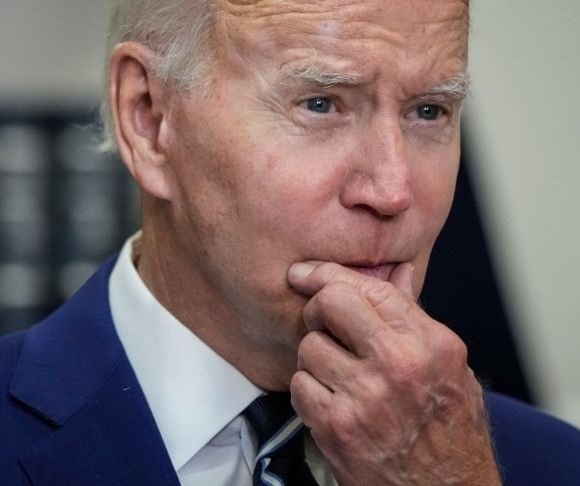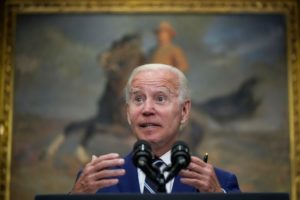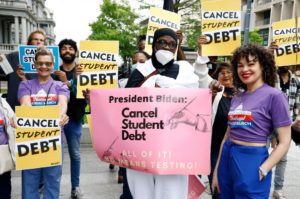
Joe Biden (Photo by Drew Angerer/Getty Images)
After falling off his bicycle at Rehoboth Beach, DE, President Joe Biden took some questions from sun-soaked reporters, with much of the press gaggle focused on economic issues of the day. Ostensibly, Biden was putting together an enormous buffet of public policy solutions, from pauses on student loan payments to gas tax rebate cards. So, slap on the sunscreen, grab the good old-fashioned aviators, and comb through the fallacies uttered by the president.
Passing Federal Gas Tax Rebates
The Biden administration is looking under every rock to find a handle on soaring gasoline prices. Instead of encouraging greater domestic production by heeding the American Petroleum Institute’s (API) list of recommendations, such as lifting development restrictions and fixing the NEPA (National Environmental Policy Act) permitting process, the president wants to fiddle around with taxes that might add to greater long-term inflationary pressures.
One such proposal is installing a gas tax holiday, a measure that would temporarily pause the 18.4-cent-a-gallon levy on gasoline. According to the president, the other consideration is a gas tax rebate card. A final decision is expected to be announced later in the week.
He also took the time to repeat the misleading “9,000 leases” point, arguing that “what they’ve [oil and gas companies] done is they’ve cut back in the refining capacity” and “they have 9,000 leases – 9,000 leases on public land, and they should either use it or lose it.”
First, according to data from the American Fuel & Petrochemical Manufacturers (AFPM) association, refiners are running at 93% capacity. Moreover, Gulf Coast refiners are reporting 95% utilization, and East Coast refiners are operating at 98% capacity.
Second, this repeated figure of 9,000 leases is completely misleading. As Liberty Nation reported in March, the fossil fuel industry is facing capital issues, environment-related litigation, red tape fiascos, and development challenges: “Put simply, it is not as elementary as Biden, [former White House Press Secretary Jen] Psaki, and other administration officials make it out to be. They can keep shrieking about 9,000 leases, but it does not resolve the complexity behind turning on the taps and accelerating output.”
Of course, with the national average for gasoline prices finally falling below $5 per gallon – due to tumbling West Texas Intermediate (WTI) crude oil prices driven by recession concerns – the White House will take credit for the slight dip, despite not doing much to instigate a decline.
Cutting gas taxes could add to long-term inflation pressures, either in energy or the broader economy, since it would increase consumer demand when supply is limited and output is lackluster. The strategy might provide near-term relief, and drivers would undoubtedly welcome the savings. However, like the multiple stimulus checks, it is more of the same policies that gave the United States 40-year-high prices.
The ‘R’ Word
A recession in 2022 or 2023 has become the baseline scenario for many economists and Wall Street analysts. Bank of America recently boosted the odds to 40%, Nomura anticipates a long recession this year as the Federal Reserve raises interest rates, and the latest Atlanta Fed Bank GDPNow estimate is sliding toward contraction for the second quarter. This is all Republican talk, according to the president.

Joe Biden (Photo by Drew Angerer/Getty Images)
When a reporter stated that half of economists think a recession is inevitable – this is incorrect, but it is a matter of semantics – Biden scolded the journalist for even suggesting such a thing.
“Not — the majority of them aren’t saying that. Come on, don’t make things up, okay? Now you’re sounding like a Republican politician. I’m joking. That was a joke,” he said. “But all kidding aside – no, I don’t think it is. I was talking to [former Treasury Secretary] Larry Summers this morning. And there’s nothing inevitable about a recession.”
While Main Street and Corporate America are penciling in a recession, what does Summers really think? Well, in a recent interview with NBC’s Meet the Press, Summers stated that a recession is likely to occur “by end of next year.” In recent weeks, Summers has uttered the same forecasts, telling CNN that a recession is probably around the corner. “I think there’s certainly a risk of recession in the next year,” he noted. “I think given where we’ve gotten to, it’s more likely than not that we’ll have a recession within the next two years.”
Perhaps Biden stopped paying attention after Summers said “hello.”
Hitting the Pause Button on Student Loans

(Photo by Paul Morigi/Getty Images for We, The 45 Million)
Pausing student loan payments and canceling $1.5 trillion in student loan debt are politically popular proposals among millennial and Generation Z voters. But are they economically feasible concepts in a scarce world? Not quite, mainly because of the inflationary impact this would have on the economy if households retain more dollars and cents to inject into a marketplace that has too few goods. Indeed, one of the contributing factors to today’s environment is that the United States is flush with cash after the astronomical fiscal and monetary expansion of the last couple of years.
The president is considering another pause on graduates’ monthly obligations as “it’s all on the table right now.”
Not only would this apply even more pressure on the consumer price index (CPI), it would be regressive, meaning that it would benefit the rich more than the impecunious. “[T]he highest-income 40% of US households possessed about 60% of outstanding education debt and accounted for three-quarters of monthly payments,” Liberty Nation noted. “However, the lowest-income 40% of households owned fewer than a fifth of outstanding debt and represented only 10% of payments.”
Lying on the Beach
President Biden is better off emulating George Costanza from the television series Seinfeld. During a 1994 episode, Costanza tells his friends at the coffee shop, “Every instinct I have, in every day of life, be it something to wear, something to eat … It’s all been wrong.” This is the current administration and the result of Bidenomics. Every aspect of the president’s economic doctrine has been incorrect. At this point, since the US economy is headed toward a recession and permanent inflation, Biden and his team might as well do the opposite of every idea presented in the War Room.
Remember to check out the web’s best conservative news aggregator
Whatfinger.com — the #1 Alternative to the Drudge

